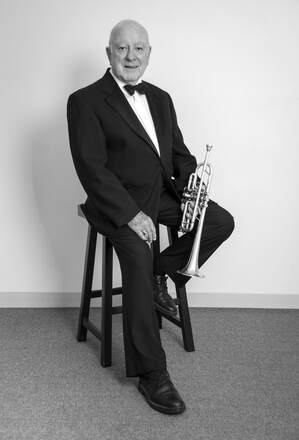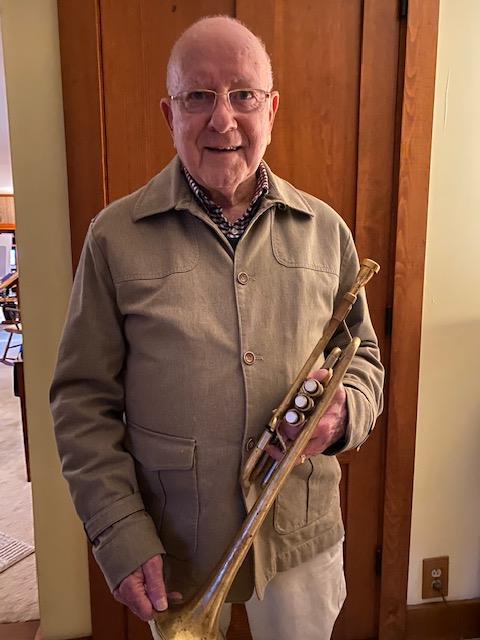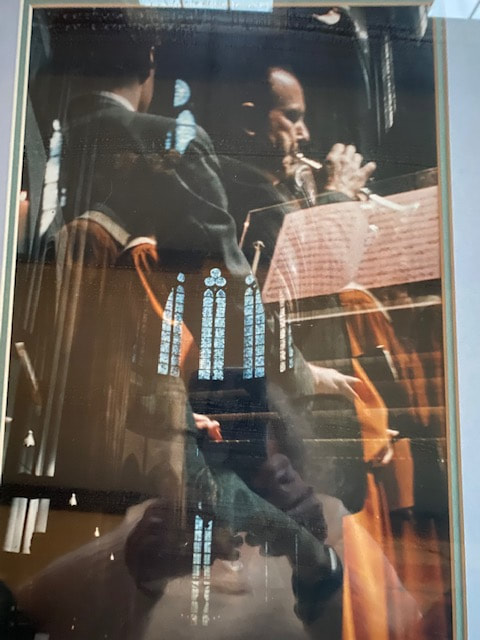Ten Thousand Hours
My parents took me to Bill when I was nine, after I had played for a year in the Theodore Judah Elementary School band class. Bill was a magician on the instrument. His good friend (and partner in a Mexican tequila venture) was Raphael Mendez the world-acclaimed trumpet virtuoso. He and Raphael would challenge each other to see who could play an excerpt faster. In my lessons with Bill it could be said that he blew me away, literally, with his trumpet virtuosity. Week after week he sat next to me and showed me precisely how to achieve my own virtuosity in the general areas of technique, musicality, and intonation. And he repeatedly told me in no uncertain terms that I would have to practice a lot to gain mastery.
The volume would undergo a steady slow decrescendo until our tones would disappear into the realm of shadow tone. During “Longtones” I was required to produce the exact same pitch as Bill’s, I mean the EXACT frequency of Bill’s tone, so that the two tones sounded precisely like one trumpet was in the room. I learned that precise intonation required a matching of tonal timbre, volume and pitch. Years later, when I was put to the test as Second Chair Trumpet in the National Symphony, the intonation refinements Bill taught resulted in the only compliment that I ever heard Principal Chair Trumpet Lloyd Geisler utter: “Ron has never played an out-of- tune note”. Lloyd and I played over 700 concerts together. After “Longtones” came “Schlossberg Slurs”, exercises in which the overtones (think bugle calls) of the instrument are connected without any break. There are three ways by which to execute bugle calls on a trumpet. They are to change embouchure (lip) aperture size, air speed and/or lip tension. If slurs are executed correctly the tonal changes are lightning fast and both tones have the same timbre. Bill was a master. All I had to do was listen carefully as he demonstrated. There was no rush. I listened to Bill for seven years. I found out later that Max Schlossberg was the teacher of my Juilliard teacher Bill Vacchiano, and was responsible for Vacchiano being hired into the New York Philharmonic. Unknown to me at the time, Bill’s
musicianship. Bill’s musical heritage came from the concert band and cornet solo traditions. He polished my technique using cornet solos and cornet method books. I had to wait for Juilliard training to learn orchestral style and tonal concept. In addition to weekly trumpet lessons, Bill Peron brought me into the Sacramento Symphony when I was 14, to perform beside him. On our first concert we performed Tchaikovsky’s Romeo and Juliet Overture and Debussy’s Fetes. The precision and emotional richness of the music were overwhelming. I was hooked. During my trumpet lessons with Bill Peron time both stood still and disappeared in a flash. The doorbell announcing Bill’s next student came way too soon. At my first Juilliard lesson, Vacchiano asked me who had taught me to play. He didn’t know of Bill Peron. He simply said: ”He did a good job.” Seven hours each summer day, in the sweltering Sacramento heat, with the puddle of sweat under my chair, and the pendulum of the metronome swinging faster and faster, I inched forward. A small price to pay for social and self identities, both enhanced by fun musical friendships, a string of first chair successes, and virtuoso solo performances in both concert bands and jazz bands. And all being enabled by a profound connection to and passion for music performance, specifically trumpet performance. And then there was the Toscanini NBC Symphony recording of Respighi’s Pines of Rome. Little did I know as a 15 year old teary-eyed kid listening to my Motorola, that in two years I would be learning trumpet artistry from two members of Toscanini’s New York Philharmonic trumpet section, William Vacchiano and Nathan Preger. And in four years I would be performing that same music of Tchaikovsky, Debussy, and Respighi as Second Chair Trumpet in Constitution Hall with the National Symphony of Washington, D.C. Ron Thompson teaches trumpet lessons at Monteverdi Music School. During the pandemic, he is actively teaching online during the pandemic. Ron is also a practicing psychologist specializing in performance anxiety. His book, On Cue: Managing Anxiety, Inviting Excellence is published by Ron at Masterful Life Performance Press. You can read his bio here. And please do click the audio file near the top of the page, below the photo, for a lovely audio recording of Ron performing the Posthorn Solo from Third Symphony by Gustav Mahler.
10 Comments
Here's what we're looking for in our new logo:
|
AuthorMonteverdi Music School has been a center for music lessons and music activity in Central Vermont for 26 years, and now establishing its outreach to the online community! Archives
October 2022
Categories |





 RSS Feed
RSS Feed

